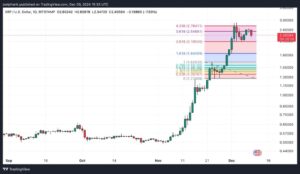Last updated:
 Why Trust Cryptonews
Why Trust Cryptonews
Ad Disclosure
We believe in full transparency with our readers. Some of our content includes affiliate links, and we may earn a commission through these partnerships.

Peter Schiff, a prominent gold advocate, has labeled Bitcoin a national security threat and “public enemy number one.” His criticism comes amid growing discussions among U.S. federal and state governments about the potential creation of a Bitcoin reserve.
Schiff’s Concerns Grow Amid Trump and Senator Lummis’s Bitcoin Reserve Plans
On December 8, Schiff expressed his concerns in an X post, emphasizing that while it’s one thing for individuals to spend their money on Bitcoin, it crosses a serious line when government officials begin using public funds to invest in it.
His comments were met with widespread opposition, including a pointed critique from Dan Held, former Head of Marketing at Kraken. Held highlighted Schiff’s shifting stance on Bitcoin, noting that Schiff had initially claimed Bitcoin would never succeed, then admitted it had succeeded somewhat but would eventually fail, and now argues it poses a major threat to the U.S. government.
Schiff’s concerns are directly tied to ongoing proposals led by Wyoming Senator Cynthia Lummis and the incoming Trump administration.
In July 2024, Senator Lummis first introduced the Bitcoin Act, which proposed that the U.S. Treasury acquire one million Bitcoin over time. The goal was to hold approximately 5% of the total Bitcoin supply, intending to establish a government-backed Bitcoin reserve similar in scope to the country’s gold reserves.
With Trump’s return to office as the 47th president of the U.S., Lummis’s proposal gains new momentum. Trump has supported a Bitcoin reserve, having outlined his vision at a Bitcoin conference in Nashville in July 2024.
He suggested that such a reserve would reinforce the nation’s financial stability and increase its influence within the global financial system.
This growing support for a federal Bitcoin reserve has stirred debate, particularly among experts and analysts. Michael Saylor, the co-founder of MicroStrategy, has even suggested the U.S. should abandon gold entirely in favor of Bitcoin.
This idea has sparked strong reactions, with former U.S. Treasury Secretary Lawrence Summers criticizing the proposal as unrealistic.
William Dudley, former president of the Federal Reserve Bank of New York, also warned that creating a federal Bitcoin reserve could cause BTC price to surge. This would benefit current Bitcoin holders but potentially destabilize the broader economy.
Could a Bitcoin Reserve Solve the $36 Trillion U.S. National Debt?
According to the U.S. debt tracking website, the national debt has now reached $36 trillion, equating to $107,000 per citizen. Crypto enthusiasts suggest that creating a Bitcoin reserve could offer a way out by leveraging Bitcoin’s growing value.
Bitcoin recently surged to an all-time high of over $103,000 on December 5, 2024, drawing attention to its potential as a financial asset.
While its price has since stabilized around $98,000, experts believe that factors such as favorable crypto regulations, increased adoption, and the establishment of Bitcoin reserves by various nations will continue to drive its value upwards.
If the price of Bitcoin continues to rise, countries that implement Bitcoin reserves could benefit substantially from its appreciation, with the U.S. using the gains to offset its enormous national debt.
MicroStrategy, a business intelligence firm, is already demonstrating how Bitcoin can be used for financial growth. The company began purchasing Bitcoin in 2020 and now holds over 423,650 BTC after purchasing 21,550 BTC for about $2.1 billion, yielding a 68.7% return so far this year.
With Bitcoin’s increasing prominence, this concept is gaining momentum as a potential game-changer in global finance.
















